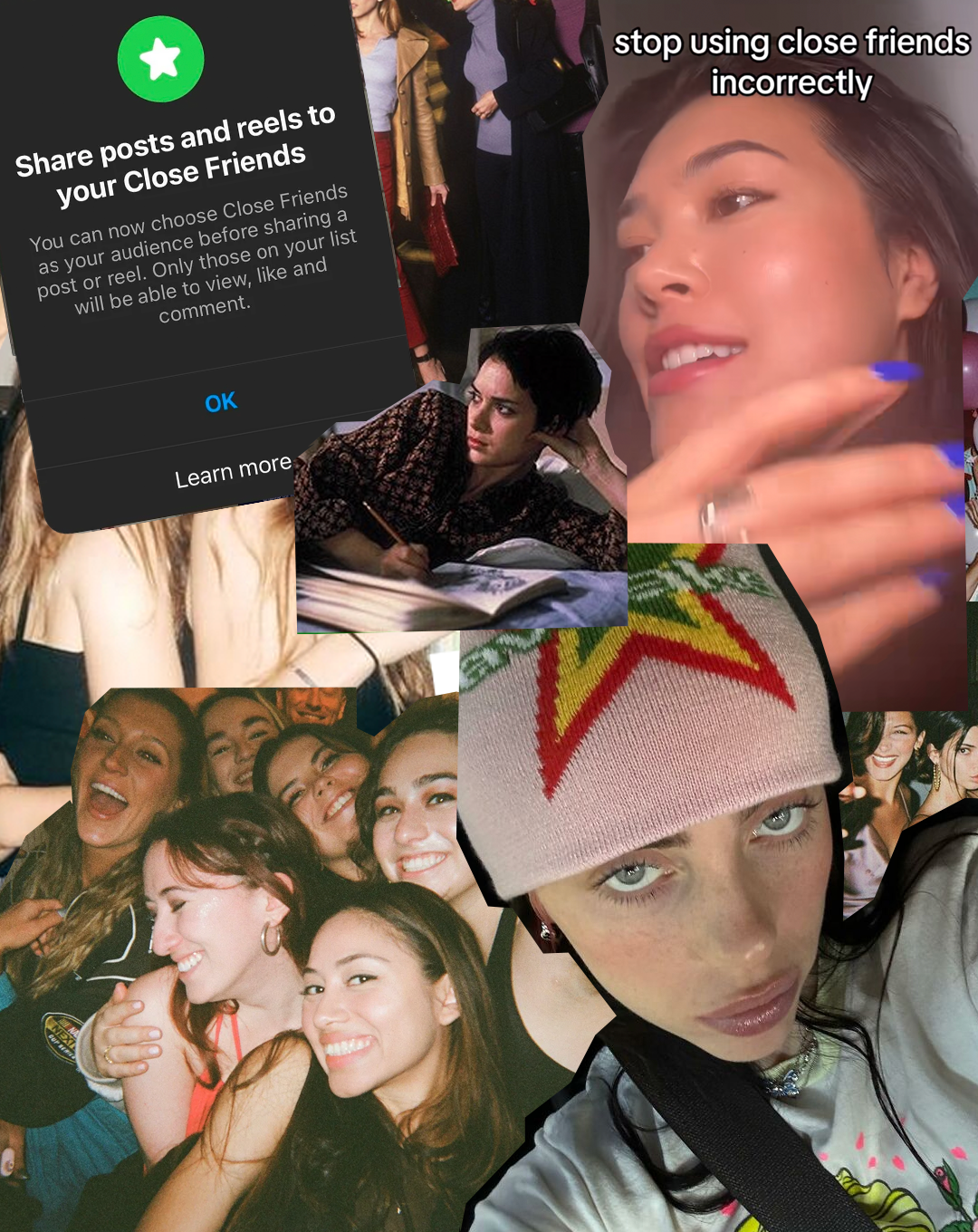Inside the Parasocial Politics of Close Friends Stories
Words: Nadia Trudel
Make it stand out
One morning, on my way to work, I passed out on the sidewalk while waiting for my bus. To be more accurate, I passed out into the street. I came to almost immediately, my palms, elbows, and knees scraped up. I put on Hello Kitty bandaids, got to work, checked my list of Instagram close friends and I posted a photo of my knees.
My close friends story isn’t exactly close friends, at least it isn’t always. There’s a regular cast, then there are supporting actors and guest stars, catered to whatever I’m posting in those 24 hours — a digital representation of the ways in which I compartmentalise. I don’t want my childhood best friend to hear that I lost my job or that I’ve memorised all 197 world countries, but I’ll let her know I tried snus or let her give me advice on friend zoning someone. Sometimes I’ll add and remove people in pairs, in case they’re hanging out. Occasionally I add someone back into the rotation because I’m worried they might notice their absence and feel bad. It feels completely ridiculous, and it is, but it’s also political.
Young people are having less sex than ever, there’s a loneliness “epidemic”, and social media is the only third space available to many. Culturally, intimacy has gotten weird. We’re alone and attention-seeking while setting boundaries and afraid to talk to strangers. The internet is built on the tension between fear and yearning, isolation and community. There are avenues for recognition and connection, yet constant reminders of the public humiliation at stake for anything from surprising your boyfriend on New Years to sitting at the airport. We’re living in the panopticon — any moment could be captured or recounted for public consumption, and it makes us paranoid and defensive.
___STEADY_PAYWALL___
Self-deprecating humour was particularly rampant in the 2010s as a useful self-defense tool in a brutal anonymous digital landscape. Our senses of humour have changed, but that protective instinct remains, and when straightforward social interactions become risky, you look for hacks. Instead of meeting a cool person at a party and asking them out, you can add them to your close friends story, see if they add you back, then, if they swipe up, it might be safe to pursue a relationship.
Close friends becomes a new vibe check: you’re not inviting someone over, but the lights are on and the door is unlocked. It’s all very casual, an implied ‘I’m not texting you because I thought of you, I just happened to have something to say about your post.’ The premise of a close friends story offers attention and intimacy. There could be one hundred people in the close friends story, or one person, but either way, your communication is less direct. It’s Gatsby’s party; the guest list might be extensive but he’s just looking to reach one person.
Last year, Billie Eilish made headlines for adding all of her followers to her close friends story, which earned her 7 million new followers in two days. The stunt could be interpreted as an indulgence in parasocial relationships, yet everyone understood that this wasn’t a personalised invitation and that they were among millions.
While parasocial keeps being used to describe the relationship between celebrities and fans, it’s worth exploring in other digital contexts. Can you build a parasocial relationship with your friend’s friend? That girl you met in the club bathroom? Two people could be watching each other’s stories, but those experiences are happening separately, so they’re not meeting each other halfway, they’re ships in the night. You become small-time content creators, figures rather than people with an active relationship. These connections can also be understood as a new type of normalised voyeurism.
“There is always a layer and a distance to online intimacy. The internet removes much of the awkwardness and grit of in person interactions, but ultimately makes the loneliness epidemic worse.”
I’ve been guilty of posting on close friends instead of actually contacting a close friend. It comes back to the fear of being too much, which I, like many women and queer people, am susceptible to. Instead of being “too much” on a personal scale, you clog feeds with “too much”, and our sense of responsibility to each other slowly erodes as you expect someone else to answer the distress signal.
Close relationships can blossom online. The separation from your physical life can be liberating and offer outlets for other parts of yourself you might keep hidden. Oddly, these friendships have a security and simplicity that ones born in the physical world don’t have, thanks to the limits imposed by the distance. Digital relationships can transfer to the real world - and this is a positive step - but the reverse is more awkward because it signals a demotion.
For hybrid relationships born in the physical world, pure digital intimacy might be impossible. Typed responses will always be more considered. You can check Google to find the perfect word. You can pause a conversation to go touch grass, vent to someone else, or watch a therapist on TikTok. You don’t have to see the look on someone’s face when you tell them you don’t have capacity for their problems. There is always a layer and a distance to online intimacy. The internet removes much of the awkwardness and grit of in person interactions, but ultimately makes the loneliness epidemic worse. Relationships born online are arguably, aware of this and therefore better equipped to overcome these hurdles. As friendships wane and fade, close friends' stories are at least a comforting illusion of intimacy.


